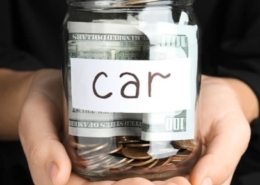Should I Buy a Car With Cash or Finance It?
The Dilemma of Buying a Car: Cash vs. Finance.
Cash vs. Finance When Buying a Car
You’ve finally decided it’s time for a new set of wheels. But now comes the big question: should you buy that car with cash or finance it?
Whether you pay cash upfront or opt for financing, the decision will impact your budget and lifestyle for years. It’s essential to weigh the immediate costs and long-term implications before choosing.
This guide will delve into the factors to consider when deciding between cash and financing, providing insights into the pros and cons of each option.
By the end, you’ll be equipped to decide what suits your needs and financial goals.
Let’s get started!
Car Buying Tip: If you’re in the market for a car, you may have noticed that a reasonable price can be difficult in today’s market. Many customers end up paying more than the suggested retail price. But don’t worry! You can still get a great deal on your new vehicle by requesting a free car price quote to compare dealer prices in your area.
Buying a Car With Cash
Let’s explore the advantages and drawbacks of purchasing a vehicle outright, covering immediate ownership, negotiation power, and the impact on liquidity.
Advantages of a Cash Purchase
1. No Interest Payments
When you pay cash for a car, you eliminate the need to take out a loan and avoid paying interest.
Every dollar you spend on the vehicle goes directly toward its purchase price, saving you significant money in the long run.
Without the burden of interest payments, you can save thousands of dollars over the vehicle’s life, allowing you to keep more money in your pocket for other expenses or investments.
Benefits of No Interest Payments:
- Cost Savings: By avoiding interest payments, you can save substantial money over the loan term.
- Financial Freedom: Without the obligation of monthly loan payments, you have greater financial flexibility and can allocate your funds toward other priorities.
- Simplified Budgeting: Paying cash simplifies your budgeting process, as you don’t have to account for fluctuating interest rates or loan terms.
2. Immediate Ownership
Purchasing a car outright means you gain immediate ownership when you pay.
Unlike financing, where ownership is transferred to you gradually as you pay off the loan, paying cash grants you complete control and title of the vehicle from day one.
This means there are no restrictions on how you use or modify the car, and you can sell or trade it in at any time without worrying about outstanding loan balances or lienholders.
Advantages of Immediate Ownership:
- Total Control: You have complete autonomy over the vehicle and can decide its use, maintenance, and modifications without restrictions.
- No Loan Obligations: With immediate ownership, you are not tied to loan agreements or monthly payments, giving you greater financial freedom.
- Flexibility: Owning the car outright allows you to sell or trade it anytime, providing flexibility and liquidity in your assets.
Related: The actual cost of vehicle ownership
3. Negotiation Power
Cash buyers often wield greater negotiation power when purchasing a car. Dealerships prefer cash transactions because they are more straightforward and involve less risk than financing deals.
As a result, cash buyers may be able to negotiate lower prices, secure better incentives, or receive additional perks such as free upgrades or maintenance packages.
Cash buyers can entice dealerships to provide more favorable terms to close the deal quickly by offering a lump sum payment upfront.
Benefits of Negotiation Power:
- Lower Prices: Cash buyers may be able to negotiate lower prices or receive discounts compared to financing deals.
- Additional Incentives: Dealerships may offer extra incentives such as free upgrades or maintenance packages to entice cash buyers.
- Faster Transactions: Cash transactions are often quicker and less complex than financing, allowing for smoother and more efficient purchases.
- How to Buy a New Car Below Factory Invoice Price – True dealer cost and the factory invoice price are not the same… dealer cost can be much lower.
- Figure a Fair Profit New Car Offer – How to calculate a fair profit new car offer.
- How to Buy a New Car Online – Not sure where to start? Use my step-by-step guide on how to buy a new car online.
Disadvantages of Cash Purchase
While paying cash for a car offers some advantages, there are also significant drawbacks to consider:
1. Large Upfront Cost
Paying cash for a car requires a substantial upfront investment, which can be a significant barrier for many buyers:
- Financial Strain: The considerable upfront cost of purchasing a car outright can strain your finances, particularly if you don’t have sufficient savings or disposable income.
- Limited Affordability: Not everyone has tens of thousands of dollars readily available to spend on a car purchase. The high upfront cost may make it challenging for buyers to afford a vehicle outright.
- Opportunity Cost: Investing a large sum of money into a car purchase upfront means that those funds are not available for other investments or financial goals, potentially limiting your financial growth or flexibility.
2. Impact on Liquidity
Using a significant portion of your savings to buy a car can have a considerable impact on your liquidity and financial flexibility:
- Reduced Emergency Funds: Tying up a large amount of your savings in a car purchase leaves you with fewer funds available for emergencies or unexpected expenses. This can leave you vulnerable to job loss, medical emergencies, or other financial setbacks.
- Limited Cash Flow: Using cash to buy a car means that those funds are no longer available for other purchases or investments, reducing your overall liquidity and cash flow.
- Missed Investment Opportunities: By allocating a large portion of your savings to a depreciating asset like a car, you may miss out on opportunities to invest in assets that generate returns or appreciate over time.
3. Limited Car Selection
Cash buyers may encounter limitations in terms of vehicle selection, as their budget dictates what they can afford:
- Budget Constraints: Cash buyers are limited to vehicles that fall within their budget, which may restrict their options and force them to compromise on features or quality.
- Restricted Inventory: Cash buyers may have fewer options when selecting a vehicle, as their available funds constrain them. This may limit their choices compared to buyers who choose financing options.
- Finding the Right Fit: With a limited budget, finding a car that meets your needs and preferences can be challenging. You may need to prioritize certain features or compromise on others to find a vehicle that fits your budget.
Considerations When Buying a Car With Cash
Before you decide to pay cash for a car, it’s essential to evaluate your financial situation and future goals carefully:
1. Financial Situation
- Evaluate Your Budget: Look closely at your current financial situation to determine if you have enough savings to afford a car outright. Consider your monthly income, expenses, and available savings to ensure that paying cash for a vehicle won’t strain your finances.
- Assess Affordability: Calculate the total cost of the car, including taxes, registration fees, and any additional expenses. Ensure you have enough funds to cover the entire purchase price without dipping into your emergency savings or other essential funds.
- Consider Maintenance Costs: Factor in ongoing maintenance and repair costs associated with owning a car. Ensure you have money to cover routine maintenance and unexpected repairs without compromising your financial stability.
2. Future Goals
- Long-Term Financial Planning: Consider how a cash purchase aligns with your long-term financial goals. Will tying up a significant portion of your savings in a car purchase impact your ability to achieve other financial milestones, such as buying a home, saving for retirement, or starting a business?
- Evaluate Investment Opportunities: Assess whether investing your savings in other assets or financial instruments would provide higher returns or better align with your long-term financial objectives. Consider the opportunity cost of tying up your funds in a depreciating asset like a car versus investing in assets that generate income or appreciate over time.
- Assess Financial Stability: Evaluate your overall financial stability and security. Ensure that paying cash for a car won’t leave you vulnerable to financial setbacks or emergencies. Maintain a sufficient emergency fund and liquidity to cover unexpected expenses or changes in your financial circumstances.
3. Alternatives
- Explore Financing Options: Review alternative payment options, such as leasing or financing, if paying cash isn’t your most practical choice. Evaluate the terms and conditions of different financing options to determine if they align with your budget and financial goals.
- Compare Leasing vs. Financing: Compare the pros and cons of leasing versus financing to determine which option best suits your needs and preferences. Consider monthly payments, mileage restrictions, and ownership rights when evaluating leasing options.
- Seek Professional Advice: Consult with a financial advisor or car-buying expert to explore all available options and make an informed decision. A professional can provide personalized guidance based on your financial situation and goals, helping you choose the best payment method for your circumstances.
Real-Time Bargain Hunting: Turn to Edmunds for instant access to the latest and greatest local deals, saving you time, money, and stress.
Financing a Car
Now, let’s look at obtaining a loan to purchase a vehicle, covering topics such as spreading payments, building credit, and accessing a more comprehensive range of vehicles.
Advantages of Financing
While financing a car comes with its own set of considerations, there are several advantages to consider:
1. Spread Out Payments
- Manageable Monthly Payments: Financing allows you to spread the cost of the car over time, typically through monthly installments. This makes the purchase more manageable month-to-month, particularly for buyers who may not have the funds to pay cash upfront.
- Preserve Cash Flow: By spreading out payments, financing preserves your cash flow, allowing you to allocate funds towards other expenses or investments. This can provide greater financial flexibility and liquidity, as you’re not tying up a significant portion of your savings in a single purchase.
- Budget-Friendly Options: Financing offers budget-friendly options for buyers who may not have the means to pay cash upfront. With various loan terms and interest rates available, buyers can choose a payment plan that fits their budget and financial goals.
2. Building Credit
- Credit Score Improvement: Making timely payments on a car loan can help you build or improve your credit score. A strong credit history demonstrates your ability to manage debt responsibly and can increase your creditworthiness in the eyes of lenders.
- Better Loan Terms: A higher credit score opens doors to better loan terms and lower interest rates in the future. With a strong credit profile, you may qualify for lower interest rates, saving you money on interest payments over the life of the loan.
- Financial Opportunities: A strong credit score can also provide access to other financial opportunities, such as lower insurance premiums, better credit card offers, and higher credit limits. By building credit through responsible car financing, you’re laying the groundwork for future financial success.
3. Access to More Vehicles
- Expanded Options: Financing provides access to a broader range of vehicles, including new or more expensive models that may be out of reach for cash buyers. With financing, you’re not limited to the cars you can afford upfront, allowing you to explore a broader range of options to find the perfect fit.
- Flexibility in Features: With access to more vehicles, buyers can choose models with additional features, upgrades, or customizations that may not be available within their cash budget. Financing allows buyers to find a car that meets their needs and preferences without compromise.
- New Car Affordability: Financing makes buying new cars easier, which often come with higher price tags than used or older models. With the option to spread out payments, buyers can enjoy the benefits of owning a new car without the hefty upfront cost.
Disadvantages of Financing a Vehicle
While financing a car offers flexibility and accessibility, there are several drawbacks to consider:
1. Interest Accrual
- Increased Total Cost: Financing a car involves paying interest on the loan amount, which adds to the total cost of the vehicle over time. The longer the loan term, the more interest you’ll pay, potentially significantly increasing the overall cost of ownership.
- Financial Burden: Interest accrual can burden buyers, particularly if they opt for longer loan terms or higher interest rates. Paying interest over the life of the loan can significantly impact your monthly budget and long-term financial goals.
- Risk of Overpaying: Buyers may overpay for their vehicle without considering interest rates and loan terms. High-interest rates or extended loan terms can result in paying more for the car than its actual value, diminishing its affordability.
2. Insurance Requirements
- Added Expense: Lenders typically require borrowers to maintain comprehensive insurance coverage on financed vehicles to protect their investment. While insurance coverage is essential for safeguarding against unforeseen events, it adds to the overall cost of ownership.
- Financial Obligation: Mandatory insurance requirements add another financial obligation for buyers to consider when financing a car. Premiums can vary based on factors such as the vehicle’s make and model, driving history, and coverage options, further increasing the cost of ownership.
- Limited Flexibility: Insurance requirements may limit buyers’ flexibility in choosing coverage options or providers. While comprehensive coverage offers protection against a wide range of risks, it can also be more expensive than basic coverage options, impacting buyers’ ability to tailor their insurance policies to their specific needs and budget.
3. Risk of Negative Equity
- Depreciation Concerns: Cars depreciate over time, meaning they lose value when driven off the lot. If the car’s value depreciates faster than the loan balance decreases, buyers may owe more on the car than it’s worth, known as negative equity.
- Financial Implications: Negative equity can have significant financial implications for buyers, as they may find themselves in a situation where they owe more on the car than they can sell or trade it for. This can make it challenging to sell or trade the vehicle without taking a financial loss, potentially trapping buyers in a cycle of debt.
- Limited Options: Negative equity limits buyers’ options regarding selling or trading in their vehicles. They may be forced to continue making payments on a car they no longer want or need, or they may have to come up with additional funds to cover the difference between the loan balance and the car’s value.
Considerations for Financing a Car
Before committing to financing a car, it’s essential to carefully evaluate the following factors:
1. Interest Rates
- Comparison Shopping: Shop around for the best interest rates and loan terms to ensure you get the most favorable financing option. Compare offers from multiple lenders, including banks, credit unions, and online lenders, to find the lowest rates and most competitive terms.
- Consideration of Terms: Pay attention to the interest rate and the loan term when comparing financing options. While a lower interest rate may seem appealing, a longer loan term can result in higher overall interest costs. Evaluate the total cost of financing over the life of the loan to make an informed decision.
2. Monthly Budget
- Financial Evaluation: Evaluate your monthly budget to determine how much you can spend on car payments without straining your finances. Consider your income, expenses, and debt obligations when calculating your budget for car payments.
- Affordability Assessment: Determine a realistic monthly payment amount based on your budget constraints. Aim to balance affordability and loan terms, ensuring that your monthly payments fit comfortably within your financial means without causing undue financial stress or hardship.
3. Ownership Preferences
- Financial Goals: Consider whether you prefer owning the car outright or are comfortable making monthly payments over an extended period. Assess how car financing aligns with your long-term financial goals and priorities, such as building savings, investing, or paying down debt.
- Ownership vs. Flexibility: Evaluate the trade-offs between owning and financing the car outright. While owning the vehicle outright provides immediate ownership and freedom from loan obligations, financing offers flexibility in spreading payments and preserving cash flow for other expenses or investments.
- Long-Term Commitment: Recognize that financing a car involves a long-term financial commitment. Consider whether you’re comfortable with making monthly payments over the loan term and whether you anticipate any changes in your financial situation that may affect your ability to afford the car payments.
FAQs About Paying Cash or Financing a Car
Cash vs. Finance: Which is Better for Buying a Car?
Both cash and financing have their pros and cons. It depends on your financial situation and preferences.
How Does Paying Cash for a Car Affect My Finances?
Paying cash for a car means no loan payments or interest, but it may strain your savings initially.
Is Financing a Car a Good Idea?
Financing can make a car purchase more affordable but comes with interest costs and long-term commitments.
Can Financing a Car Help Build My Credit Score?
Yes, making timely payments on a car loan can positively impact your credit score over time.
What Are the Risks of Financing a Car?
Risks include accruing interest, potential negative equity, and added insurance requirements.
How Do I Find the Best Financing Options for a Car Purchase?
Shop around, compare interest rates and loan terms, and consider factors like monthly budget and future financial goals.
Making the Right Choice: Conclusion on Buying a Car with Cash vs. Financing
In conclusion, buying a car with cash or finance is significant and requires careful consideration.
Let’s recap the main points discussed in this article and offer some final advice for making the best choice for your needs:
Recap of Main Points
- Pros of Paying Cash:
- Immediate ownership and freedom from loan obligations
- No interest payments, potentially saving thousands of dollars
- Greater negotiation power and flexibility in the buying process
- Cons of Paying Cash:
- Large upfront cost, potentially straining finances or depleting savings
- Impact on liquidity and financial flexibility
- Limited car selection within budget constraints
- Pros of Financing:
- Ability to spread out payments, making the purchase more manageable on a monthly basis
- Opportunity to build credit with timely payments, opening doors to better loan terms in the future
- Access to a wider range of vehicles, including new or more expensive models
- Cons of Financing:
- Accrual of interest, increasing the total cost of the vehicle over time
- Insurance requirements and added expenses
- Risk of negative equity if the car depreciates faster than the loan balance decreases
Encouragement for Informed Decision-Making
We encourage readers to carefully weigh their options and consider their financial circumstances and goals before deciding.
Whether you pay cash for a car or finance it, making an informed choice that aligns with your budget, preferences, and long-term financial objectives is essential.
Final Advice for Choosing to Buy a Car With Cash or Financing it
Ultimately, there is no one-size-fits-all answer to paying cash vs. financing dilemma. Your best choice will depend on your financial situation, credit history, future goals, and personal preferences.
Here are some final thoughts and advice to help guide your decision:
- Evaluate Your Budget: Assess your budget carefully to determine how much you can afford to spend on a car purchase without straining your finances.
- Consider Long-Term Implications: Think about the long-term implications of your decision, including the impact on your credit score, financial stability, and overall financial goals.
- Shop Around: Explore financing options from multiple lenders to find the most favorable terms and interest rates. When comparing offers, consider loan duration, down payment requirements, and prepayment penalties.
- Seek Professional Advice: If you’re unsure which option is best, consider consulting with a financial advisor or car-buying expert. They can provide personalized guidance based on your circumstances and help you make an informed decision.
By carefully considering the pros and cons of buying a car with cash versus financing it, you can make a decision that’s not only financially sound but also tailored to your unique needs and preferences.
Remember, the goal is to find the option that aligns with your financial goals and allows you to enjoy your new car confidently.
















